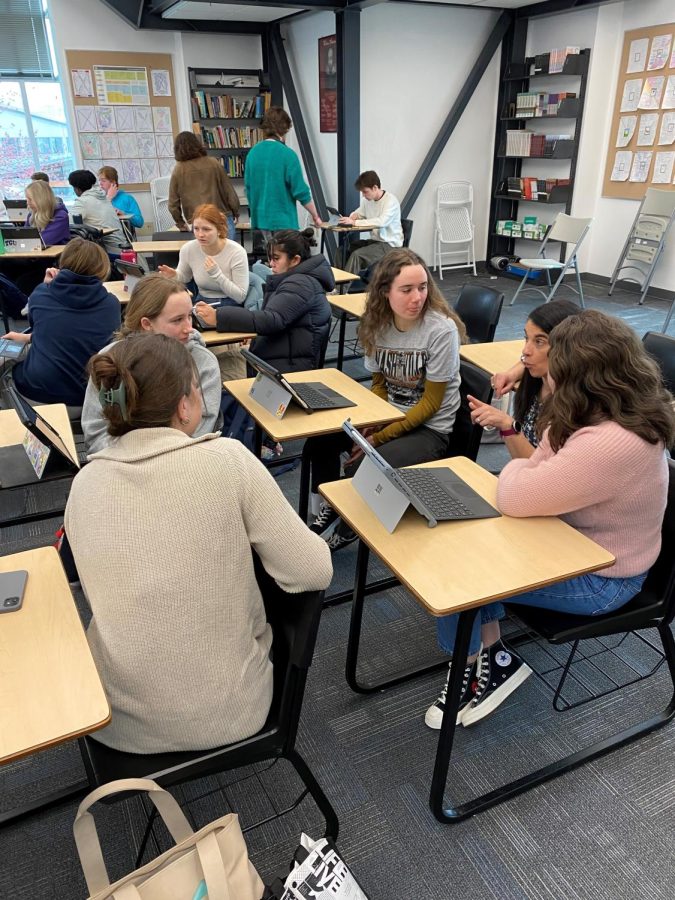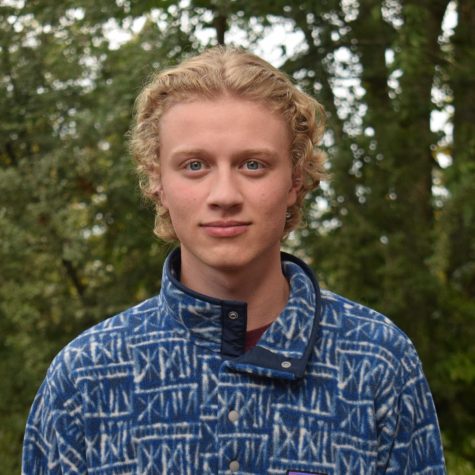Disease & Social Responsibility: Empowering Students to become Agents of Change in Global Health
Mrs. Matthews works with a group of students in Disease and Social Responsibility. The class views global health issues through a theological lens.
April 26, 2023
Among the four senior seminar classes for seniors to take at Seattle Prep is Disease and Social Responsibility. Like all senior seminar courses, Disease and Social Responsibility is a course that challenges seniors to advance and apply what they’ve learned at Prep about world issues and spirituality. It is taught by theology teacher Ms. Deana McNeill and science teacher Mrs. Laurie Matthews.
Matthews, who teaches freshman biology and AP biology, said that Disease & Social Responsibility is “a great opportunity to dive into complex global health issues with smart and passionate students.”
The course is interdisciplinary, meaning it covers more than one field of study. Disease and Social Responsibility covers both the theological perspective of health and disease in diverse global cultures and the scientific perspective of the many components of effective disease management.
Ms. McNeill, who said that she would be a doctor or healthcare worker of some sort in another life, explains the interdisciplinary approach. “It is often hard for people to understand that theology and science are not at odds with one another. Theology moves us beyond the science and asks, ‘How can I use the knowledge I have gained to be of service to others and build a more just and equitable world?”
Matthews said that she enjoys teaching the science of disease with McNeill because “she brings an outstanding perspective and background in theological, social, and ethical methodologies. Of course, I love to nerd out on the science content, but treating disease is so much more than science and medicine. It is exciting to think about each senior using their gifts and talents to make the world a more just place for all.”
McNeill said the goal of Disease & Social Responsibility is “to challenge and empower students to think about how they can apply their education, Jesuit ideals, and talents to real-world situations in order to make the world a more just place for all.” D&SR Students do this by asking questions such as “What factors contribute to the proliferation or eradication of these diseases? What are the social, cultural, political, and economic obstacles to global health? How can theology inform our decision-making and approaches to global health? Why should we care, and why and how should we act? And, what is my duty to my fellow human beings?”
Students in Disease & Social Responsibility will gain a basic knowledge of the immune system, vaccination, malaria, tuberculosis, and HIV/AIDS, and the importance of systems or upstream approach to public health. Other topics include liberation theology, preferential option for the poor, structural violence, different ethical approaches to decision-making, and cultural competency. Additionally, students will look into how they have grown in the characteristics of the Grad at Grad while at Prep and how to apply those concepts when addressing global health.
Students have been reading Tracey Kidder’s “Mountains Beyond Mountains.” This book is about Dr. Paul Farmer and the humble beginnings of his clinic in Haiti, Partners in Health. McNeill said, “Farmer embodies so many Catholic and Jesuit ideals in his approach to medicine. So, students see an example of what faith in action can look like as they learn about the injustices the poor and vulnerable face regarding healthcare and how this affects their ability to survive and thrive as individuals, communities, and nations.”



